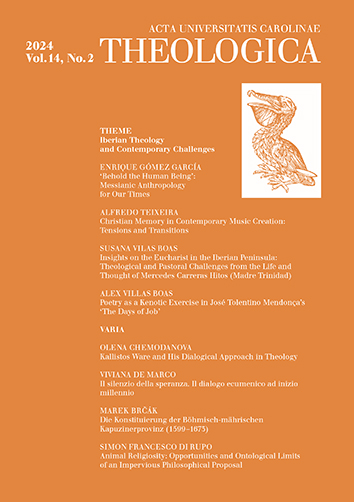AUC Theologica is a peer-reviewed journal for theology published twice a year. As we publish original papers in English, German, French, and Italian, our mission is to serve as a platform both for Czech researchers, who can present their research results in these languages, and for international contributors, who are invited to enter the academic theological discussion in the heart of Europe.
The journal focuses on a wide range of theological disciplines, such as systematic theology, biblical studies, patristic studies, pastoral and spiritual theology, religious education, church history, etc. Within these fields, the journal seeks to reflect the current theological questions and problems, which often requires interdisciplinary approaches. Supporting the intersection of various theological disciplines, we thus also welcome theological papers touching other academic fields including philosophy, sociology, literary studies, and science.
Each issue consists of two sections. The thematic section presents papers of the same focus. The section called ‘Varia’ invites papers dealing with various theological themes from the perspective of all Christian traditions. Our current and past issues are approachable for free on this website in the form of Open Access.
AUC THEOLOGICA, Vol 6 No 2 (2016), 119–134
Teologie a nejnovější přínosy ostatních věd ohledně antropogeneze
[Theology and the Most Recent Contributions of other Sciences concerning Anthropogenesis]
Ctirad V. Pospíšil
DOI: https://doi.org/10.14712/23363398.2016.17
published online: 22. 01. 2017
abstract
The author of the article has two aims. At first, he wants to inform theologians about the newest findings of paleogenetics, paleoanthropology and bioculturology relevant for the theology of creation, theological anthropology, moral theology and fundamental theology. In theology, it is necessary to find a clear borderline between not yet being human and being already human. Searching for this borderline is the second aim of the study. On the level of technology and communication, we can observe a continual development. Although there can be found some leaps, theologians are not able to find a clear borderline. According to the author, this line is marked by moral consciousness, which either exists or not. Human being is a creature able to sin. The time of crossing this Rubicon cannot be determined according to archaeological discoveries. It could be in the time of Homo heidelbergensis, but certainly in the time of classical Neanderthals and anatomically modern people.
keywords: Theology; Anthropogenesis; Evolution; Paleoanthropology; Paleogenetics; Bioculturology

Teologie a nejnovější přínosy ostatních věd ohledně antropogeneze is licensed under a Creative Commons Attribution 4.0 International License.
148 x 210 mm
periodicity: 2 x per year
print price: 100 czk
ISSN: 1804-5588
E-ISSN: 2336-3398
